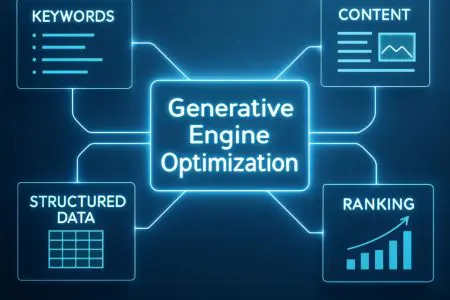Search is evolving, fast. Generative AI tools like ChatGPT, Gemini, and Perplexity are changing how people find information and how brands are discovered. Traditional SEO still matters, but it no longer guarantees visibility.
Generative Engine Optimization (GEO) is the next step. It builds on SEO fundamentals but focuses on how AI systems interpret and summarize your brand when they generate answers.
This is the first article in a three-part series exploring the pillars of GEO, beginning with its foundation: Technical GEO.
What is generative engine optimization?
GEO amplifies SEO by adapting it for the new reality of search. Instead of chasing rankings, GEO helps ensure your brand is understood and referenced accurately in AI-generated results.
That requires more than optimizing for algorithms. Generative engines need clear signals of what your business does, what you stand for, and whether you can be trusted.
Traditional SEO tells search engines what you say. GEO ensures AI systems understand why it matters.
Technical GEO: The foundation of AI visibility
If SEO helps your site get found, Technical GEO ensures it gets understood. It’s about helping AI systems read and reference your site, so it can answer questions instead of simply listing links.
Large language models (LLMs) use structured data, entities, and contextual clues to determine which brands to cite. The stronger your technical foundation, the more likely your brand will be included in those answers.
Here’s what matters most when building that foundation.
#1 – Structured data and schema markup
Structured data is the shared language between your website and AI systems. Schema markup has been part of SEO for years, but in the GEO world, it’s what makes your expertise legible to AI.
To improve your AI visibility, follow these tips:
- Use rich schema types like FAQ, HowTo, Service, and Organization.
- Clearly define relationships between entities including your people, your brand, your services, and your partners.
- Keep all data consistent across your site and external sources such as Google Business Profiles, Wikidata, and review platforms.
In short, structured data connects the dots for AI. It tells generative systems who you are, not just what you publish.
#2 – LLM discovery
One of the newest areas of Technical GEO involves user-agent-based delivery. In other words, you can tell AI crawlers where to look and what to focus on.
Consider creating an LLMs.txt file (or using <script type=”text/llms.txt”></script>) to guide AI systems toward the most accurate and up-to-date content. It’s like handing a journalist your key facts, pointing AI directly to verified, structured, and factual information.
By defining which pages and data sources represent your brand best, you remove guesswork and improve your chances of being referenced correctly.
#3 – Site architecture and crawl accessibility
Generative engines prefer websites that are well organized and easy to interpret. Think of your website as a map. If it’s logical for users, it will also be logical for AI.
To help AI systems easily navigate your site:
- Maintain a clean URL hierarchy and consistent internal linking.
- Use clear header structures (H1 and H2 tags) to make content scannable.
- Avoid burying important pages deep in complex menus.
- Design your navigation around user intent so both people and machines can move easily through your content.
#4 – Site speed and technical health
AI crawlers are impatient. Slow or bloated sites are often ignored in favor of faster, more efficient sources. To improve website performance:
- Compress images and streamline scripts to ensure your website loads quickly.
- Ensure your website works seamlessly across both desktop and mobile devices.
- Follow modern security standards.
- Fix crawl errors, broken links, and redirect chains.
#5 – Entity optimization and brand identity
AI doesn’t see your brand as a collection of pages. It sees it as an entity containing a connected set of facts and relationships. To help AI recognize and trust your brand, focus on building a consistent and connected digital identity.
You can do this by auditing your brand’s digital footprint for consistency. Make sure your business name, services, and messaging align across your website, press mentions, directories, and social platforms. You can also use schema and structured data to link your brand with recognized topics and organizations.
Beyond your own site, build visibility through trusted brand mentions on platforms like Reddit and YouTube, or even third-party review sites. These references strengthen your credibility and help AI systems associate your brand with authority and trust.
#6 – Preparing for agentic-based browsers
We’re moving toward a world of agentic-based browsers. These are AI-driven tools that will browse, analyze, and summarize content autonomously. Technical GEO lays the groundwork for this future.
To prepare, focus on making your content machine-readable and extraction-ready. You can do this by providing structured summaries and a clear data hierarchy, using consistent context signals, ensuring your pages load fast and use clean, semantic code.
The future of technical GEO
Technical GEO is the foundation for how brands will be discovered and understood in an AI-driven world. It bridges the gap between human storytelling and machine interpretation.
Soon, AI agents won’t just list links. They’ll summarize and explain. Brands with structured and authoritative data will be part of that conversation. Those without it will be invisible.
The future of digital visibility belongs to brands that teach machines how to understand them. Keep your eyes peeled for the rest of our GEO blog series, exploring:
- Content & authority building – how to create authentic, expert-driven content that AI trusts and cites.
- Measurement & growth – how to track, attribute, and scale your visibility across AI platforms.
Ready to strengthen your technical GEO foundation?
Generative search rewards clarity, speed, and structure. Elixirr Digital helps brands build that foundation, ensuring AI understands and trusts their content.
Get in touch to start shaping how your brand shows up in the future of search.
Let's collaborate
Partner with us
Let’s work together to create smarter, more effective solutions for your business.
Related blogs
Who we are
Explore how our culture and expertise fuel digital innovation
Join us







